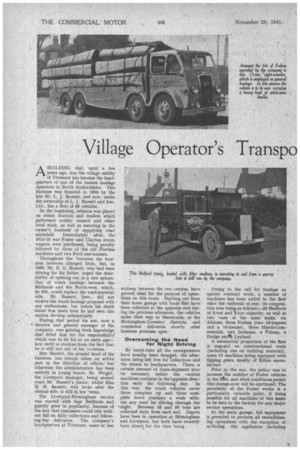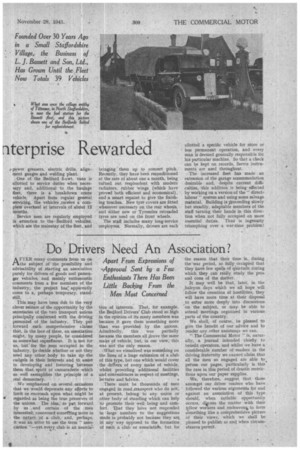Village Operator's Transpo
Page 22

Page 23

If you've noticed an error in this article please click here to report it so we can fix it.
Iterprise Rewarded ABUILDING that, until a few years ago, was the village smithy of Tittensor has become the headquarters of one of the busiest haulage operators in North Staffordshire. This business was founded in 1908 by the late Mr. L. J. Bassett, and now, under the ownership of L. J. Bassett and Son, Ltd., has a fleet of 39 vehicles.
In the beginning, reliance was placed on steam tractors and trailers which performed county council and other local work, as well as assisting in the owner's business of supplying road material. ImmediatelY after. the 1914,18 war Foster and Clayton steam wagons were purchased, being quickly followed by three of the old Peerless machines and two Ford one-tonners.
Throughout the 'twenties the business interests changed little, but, in 1930, Mr. R. G. Bassett, who had been driving for his father, urged the desirability of opening out in a new sphere, that of trunk haulage ' between the Midlands and the North-west, which, he felt, could replace the road-material side. M. Bassett, Senr., did not receive the trunk-haulage proposal with any enthusiasm, but before his death "about five years later he had seen this section develop substantially.
During , that period his. son, now a • director and general manager of the company, was gaining fresh knowledge that fitted him for the responsibility' which was to be his at an early age— bow early is obvious from the fact that he is still not out of his 'twenties.
Mrs. Bassett, the present head of the business, has always taken an active part in the direction of affairs, but otherwise the administration has been entirely in young hands, Mr. Wright, the Liverpool manager„ being several years Mr. Bassett's junior, whilst Miss H.M. Bassett, who looks after the clerical side, is still in her 'teens.
The Liverpool-Birmingham service was started with four Bedfords and quickly grew in popularity, because of the fact that customers could rely without fail on daily collections and following-day deliveries. The company's headquarters at Tittensor, more or less
midway between the two centres, have proved ideal for the purpose of operations on this route. Starting out from their home garage with loads -that have been collected at the opposite end during the previous afternoon, the vehicles make their way to Merseyside, or the Birmingham-Coventry districts, and commence deliveries shortly after business premises open.
Overcoming. the Need for Night Driving By lunch-time all the consignments have usually been dropped,' the afternoon being left free for collections and the return to headquarters. There, a certain amount of trans-shipment may be necessary before the various machines continue in theopposite direction early the folldwing day. In this way, the trunk -vehicles cover three complete up and three complete down journeys a week without any need for driving through the 'night. Between 45 and 50 tons are collected daily from each end. Depots have been in operation at Birmingham and Liverpool, but both have recently( been closed, for the time being. Owing to the call for haulage on special contract work,, a number of machines has been added to the fleet since the outbreak of war, its composition now being as follows:-20 Bedfords of 2-ton and "3-ton capacity, as well as two vans of the same make, six ' Albions, three Fodens (two 15-tonners and a 10-tonner), three Morris-Corn• mercials, two Indianas, a Vulcan, a Dodge andgh Leyland. '
A substantial proportion of the fleet is engaged on constructional work (including one on building material), some 15 machines being equipped with tipping gears, mostly of Edbro manufacture.
Prior to the war, the policy was to ' increase the number of Foden vehicles in the flPet, and when conditions permit this change-over will be continued. The proximity of the Foderi works is a particularly valuable point, it being possible for all machines of this make to be sent to the factory for any major service operations.
At the main garage, full equipment is provided to perform all reconditioning operations with the exception of re-boring, the appliances including power greasers, electric drills, alignment gauges and welding plant.
One of the Bedford 5-cwt. vans is allotted to service duties when necessary and, additional to the haulage fleet, there is a breakdown crane vehicle.. Apart from regular general servicing, the vehicles receive a complete overhaul at intervals of about 12 months, Service men are regularly employed in attention to the . Bedford vehicles, which are the mainstay of the fleet, and bringing them up to concert pitch. Recently. they have been reconditioned at the rate of about one a month, being tutned out resplendent with modern radiators, rubber wings (which have proved both efficient and economical), and a smart repaint to give the finishing touches. New tyre covers are fitted whenever necessary on the rear wheels, and either new or Tyresoles retreaded tyres are used on the front wheels.
The staff includes many long-service employees. Normally, drivers are each allotted a specific vehicle for More or less permanent operation, and every man is deemed generally responsible for his particular machine. So that a check can be kept on records, Servis instruments are used throughout.
The increased fleet has made an extension of the garage accommodation desirable and, despite current difficulties, this addition is being effected by working on a version of the" direct labour" system and using some salvage material. Building is proceeding slowly but steadily, adaptable members of the staff turning their hands in this direction when not fully occupied on more essential duties. Thus is ingenuity triumphing over a war-time problem!




















































